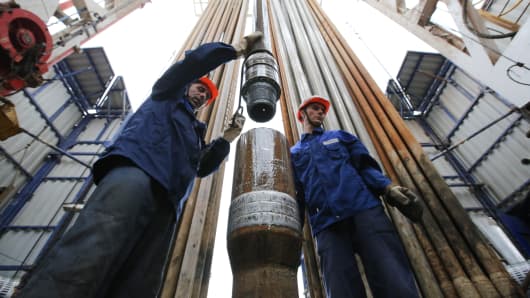Home > Investment Insights > Details |
Has the world's largest sovereign wealth fund peaked? |
|
|
Just weeks after the Nobel prizes were announced out of Norway, world attention will shift back to Oslo this week when Norwegians find out how well their country's sovereign wealth fund, the world's largest, has weathered the rollercoaster ride in the price of oil.
The signs are worrying: For the first time ever, Norway announced plans to tap its fund to make up for lost oil revenues earlier this month.

Andrey Rudakov | Bloomberg | Getty Images
Workers secure drilling pipe sections on an oil drilling tower
The country plans on withdrawing around $450 million from the fund which had $820 billion under management as of the end of June of this year.
While this is not a massive slice of the pie, analysts are worried that the behemoth fund's days of stellar growth may be numbered especially with oil prices predicted to stay low for longer and the $100 per barrel price tag something of a distant memory.
The fund, officially called the Government Pension Fund Global, has accumulated over 25 years of investing oil revenues, making headlines at the start of last year when it rose to 5.11 trillion Norwegian crowns, which at the time was worth $828.66 billion. This meant every person in Norway became a theoretical crown millionaire for the first time thanks to strong oil and gas prices.
Sovereign wealth funds control around $7 trillion of assets, largely created through investing natural resource revenues. After Norway, oil rich Abu Dhabi and Saudi Arabia manage in the region of $770 billion and $670 billion respectively, according to data from Sovereign Wealth Fund Institute.
Norway's economy is currently not under any strain due to soundly managed finances according to economists. But with 40 percent of Norway's exports coming from oil and gas and oil prices down 60 percent since last summer, the fund has come under pressure.
The fund's market value fell by 115 billion Norwegian crowns ($13.7 billion) to $820 billion in the second quarter of this year according to Norges Bank Investment Management official data, with fluctuations in the Norwegian crown and a surging U.S. dollar decreasing the fund's value by 53 billion crowns.
The fund, which says its mandate is to "save for future generations" will reveal its third-quarter results on Wednesday which should further reveal how the fund has coped with this summer's market sell-off
"The fixed income portion of the fund generates more than the $450 million drawdown expected next year in interest over the next 12 months, so the fund doesn't actually have to sell assets to meet the government's financial needs," Nicholas Colas, chief market strategist at Convergex said.
"Some 60 percent of sovereign wealth fund assets are domiciled in oil- and gas-producing countries. So if you believe energy prices will remain low for the next 10 years, then sovereign wealth funds might continue to shrink," Colas said.
'AAA' rating under pressure?
To help counteract the effects of lower oil prices on the Norwegian economy, the country's policymakers have proposed a range of measures, including cutting the main corporate tax rate next year, to protect the fund from further sizable withdrawals to top up the deficit.
The country's budget proposed for 2016 has forecast a structural non-oil deficit of 194 billion crowns, which the Ministry of Finance estimates at 2.8 percent of the market value of the sovereign wealth fund - "well within" government guidelines, said U.S ratings agency Fitch in a note to clients.
"Low oil prices and lower investment in the oil sector are translating into slower growth in the broader Norwegian economy. But the exchange rate and the policy response by the authorities are offsetting the impact from lower oil prices," said Fitch ratings analyst, Alex Muscatelli.
The country has been awarded with a 'AAA' from the ratings agency, the highest sovereign rating available with a stable outlook.
But this could come under pressure if oil prices were to face a "sharper and sustained fall" as this could lead to a "rapid erosion" of Norway's sovereign and external balance sheet over the medium term, Muscatelli warned.
Oil prices lower for longer
"In the longer run, the economy will need to rebalance away from its reliance on oil and gas," said Jack Allen, European economist at Capital Economics.
The latest investment survey from Statistics Norway, the government's statistics office, suggests that oil and gas firms expect their investments to fall by around 10 percent this year and another 6 percent in 2016.
An improvement in oil prices in the near-term looks also looks unlikely, according to Capital Economics forecasting Brent crude, currently trading around $47, to hit $65 per barrel by end-2017.
"But regardless of when oil prices turn, sovereign wealth funds are large enough right now – and for the near future – to play a prominent global role in capital markets," Colas said.
|
|
|
|
| |
|
|
